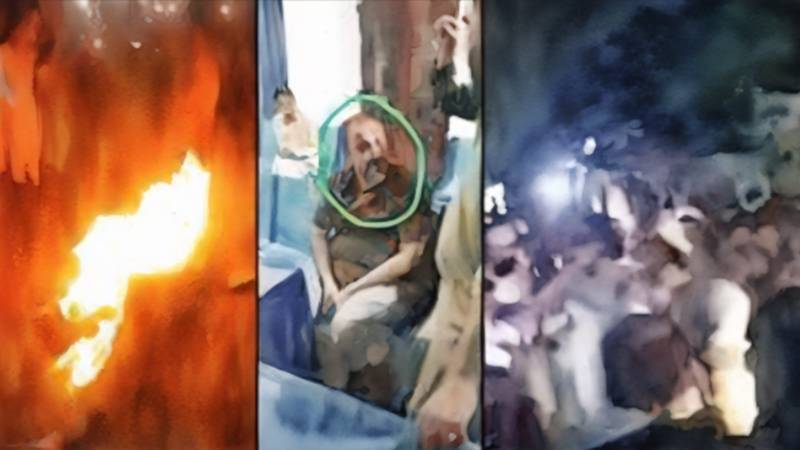
On the 11th of August 1947, Mohammad Ali Jinnah, the founding father of the nation, delivered his historic landmark speech in the constituent assembly and declared categorically “You are free. You are free to go to your temples. You are free to go to your mosques or any other place of worship in this state of Pakistan. You may belong to any religion or caste or creed – that has nothing to do with the business of the State.” The frequent gory and despicable displays of religious intolerance and bigotry in Pakistan are a stark reminder that the Muslim state established by Mohammad Ali Jinnah as a tolerant enlightened secular democracy does not exist today and we are in the grip of vicious fundamentalist elements who are bent upon establishing their archaic writ on the people of Pakistan.
The latest drama of religious intolerance and extremism was witnessed in the picturesque suburbs of Swat on 20 June, when an enraged and religiously charged mob of religious fanatics attacked a police station, grabbed a man suspected of blasphemy beat him mercilessly and then proceeded to burn him alive. This latest horror story is just a repeat of many horror stories in the past, when houses of religious minorities have been torched or people burned alive on mere suspicion of insulting the religion of Islam. This incident, much like the attack on the Army Public School in Peshawar, has once again shaken the government from a deep slumber and a new action plan has been announced to combat the scourge of religious intolerance.
The latest show of barbarity is the beginning of something new and different. Ever since the new government of the Taliban in Kabul took power, the Tehreek-i-Taliban Pakistan (TTP) ensconced in the safety of Afghanistan has continued to launch terrorist attacks in the Swat valley and the merged districts of Khyber-Pakhtunkhwa, and the supporters of the Taliban in Pakistan have been emboldened to increase their nefarious activities.
After the government announcement of a new action plan against the terrorist organisations, PTI members protested loudly on the floor of the national assembly and loudly assailed the government for launching any action against the terror machine. The government authorities have taken notice of the Swat incident at the highest levels: newspapers have splashed its gory details in banner headlines, and police and security officials have been ordered to submit their reports. Taliban apologists are now busy spinning their fairy tales and telling the nation that Muslims can’t do this, and that this is the work of some mysterious foreign hand or the result of some Jewish conspiracy or the action of the Indian spy agency RAW. The media is busy digging up the past and publishing some previous incidents even more gruesome and cruel than this one, and the authorities are repeating the litany that such elements will be dealt with an iron hand and such behavior will not be tolerated.
The problem of religious extremism and intolerance is now too big and complex – probably beyond the ability of the authorities as they stand. The government of the day and the opposition parties are too busy in their own petty political quarrels, entirely incapable of seeing beyond the tip of their nose.
Pakistan has become the laughing stock of the world. The international media often depicts this country the land of religious intolerance extremism and barbarity. Religious minorities in Pakistan have faced murder and harassment just because they are non-Muslims.
Minorities in the Islamic Republic of Pakistan are not safe. They have been attacked and maimed by Muslim mobs. Christians, Hindus and Ahmedis have been slaughtered, lynched and burnt alive. Their homes have been torched and mostly on the flimsiest pretext of alleged blasphemy or disrespect to Islam. Places of worship like churches or Hindu temples have been set on fire, sometimes with people trapped inside them. Hindu girls have been abducted forcefully converted and married to their abductors or Muslim clerics and the authorities have been silent spectators to these atrocities.
When religion becomes the business of the state, intolerant and extremist religious elements make it their business to force their writ on the people of the land. One particular community, the Ahmedis, have been the biggest targets – having been officially declared outside the pale of Islam, they have faced religious outfits targeting their members, destroying their places of worship and banning the practice of their belief even within the privacy of their homes.
What to say of minorities, when even smaller Muslim sects have faced the wrath of the extremist elements and many of them have been brutally beaten or locked up on flimsy charges! The blasphemy laws are now a deadly weapon in the hands of religious fanatics. The law of blasphemy is enforced not by the courts or the police but by religiously charged Muslim mobs who flout the law by becoming judge, jury and executioner.
The state of Pakistan is guilty on all counts. Religious fundamentalism is out of their control, even though initially it was seen merely as a weapon to combat external forces. Religious groups have been sheltered, armed, trained and launched against other countries to promote our foreign policy agenda. Religion as a weapon of war has brought misery death and chaos to the people of Pakistan. This policy of the state has not strengthened state security but has given immense power in the hands of extremist forces.
Pakistan could possibly learn a lesson from Saudi Arabia and Indonesia. Both these Muslim nations have by now recognised the dangers of religious extremism and are now very seriously implementing religious reforms. Before our very eyes, a fundamentalist religious society in Saudi Arabia is opening up it society getting rid of some archaic practices, enhancing governance and improving its image in the community of nations.
We need a serious public discussion on what prevents Pakistan from following an equivalent route of reform.

